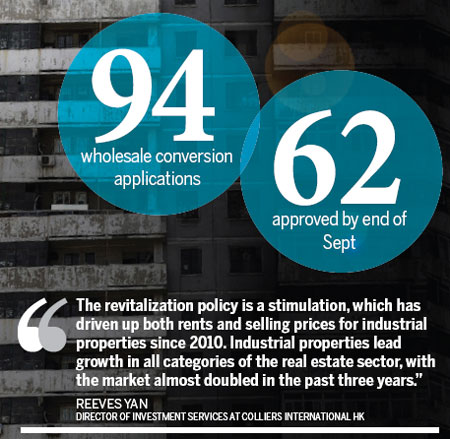Banking on Hong Kong's future
Updated: 2013-11-15 06:54
By Oswald Chan(HK Edition)
|
|||||||||
Hong Kong's family-owned banks are being rapidly gobbled up by a juggernaut of mainland banks, busily gearing up for growing market competition. As Oswald Chan reports, the banking consolidation process heralds a new era in the Hong Kong banking industry.
YueXiu, the trading arm of Guangzhou's municipal government, announced in late October it had bought a 75 percent stake in Hong Kong's Chong Hing Bank for HK$11.64 billion ($1.5 billion). The purchase price of the majority stake in Chong Hing Bank was 2.08 times book value and lay in the lower tier of market estimates.
YueXiu, which has interests in real estate, securities and toll road operations, cited several reasons for its acquisition. One reason was the progressive internationalization of the yuan, coupled with Hong Kong's growing importance as an offshore yuan center.
Chong Hing Bank operates 53 branches in Hong Kong. YueXiu's acquisition presents the conglomerate additional cross-border financing options for its business operations.
The YueXiu buyout represents the first acquisition of a Hong Kong lender since 2008. The deal also marks the first time a Hong Kong bank has been acquired by an entity outside the financial industry in 27 years, when the China Merchants Group conglomerate bought the Union Bank of Hong Kong, in 1986.
Hong Kong's three remaining family-run banks are also expected to be swept up by mainland corporations. Reuters reported that the country's fourth-largest bank, Agricultural Bank of China (ABC), is considering a bid for Wing Hang Bank, one of the three remaining family-run banks in Hong Kong, along with Dah Sing Banking Group and Bank of East Asia.
If ABC does acquire Wing Hang Bank, the mainland lender would acquire much-needed international exposure giving it an advantage over its chief rivals, the Industrial and Commercial Bank of China (ICBC), China Construction Bank (CCB) and Bank of China (BOC).
Other potential bidders for Wing Hang Bank include Singapore's third-largest lender, Oversea-Chinese Banking Corporation and Australia and New Zealand Banking Corporation. Wing Hang Bank's controlling shareholders said in September that they had received preliminary offers from undisclosed third parties.
Amid the increasingly volatile financial landscape, escalating operations costs, increasing use of Internet technology, growing regulatory requirements and the difficulty of finding family heirs to take up the business, local family-run banks are finding it increasingly difficult to compete, leaving them easy targets for acquisition. The number of local small and mid-sized banks in Hong Kong has dropped sharply over the last decades due to a spate of acquisitions.
"Things are not all rosy for Hong Kong banks," says KPMG Head of Banking Paul McSheaffrey in a KPMG Hong Kong Banking Survey 2013. He continues, "New regulations, many of which are globally driven, are a key issue for many banks, and go beyond the challenge of implementation. In many cases banks are questioning whether they should remain in certain business lines or markets."
According to the KPMG survey, Hong Kong-based lenders are confronting increasingly difficult market hurdles, such as the low net interest margins, high cost-to-income ratio and a highly competitive funding environment.
Basel III rules
The new Basel III rules regulating bank finances could impose additional challenges on local family-run banks. Principal shareholders would be required to maintain core capital ratios, to maintain their stakes while fundraising is in progress. The growing scrutiny over sales of wealth management products adds even greater burdens of regulatory compliance burdens to local small-sized lenders.
Bank of America Merrill Lynch estimates that the return-on-equity of small family-run banks in the city has slumped to 9 percent, from about 20 percent in 2001.
"We believe this merger and acquisition (M&A) theme will continue to develop for remaining players like Wing Hang Bank and Dah Sing Banking Group since it is not in their interests to compete in an increasingly condensed and hyper-competitive market dominated by global players," says Adam Chan, a banking sector analyst at CCB International Securities.
"This may be the last and most lucrative opportunity for the family-owned banks to sell at a significant premium," Chan adds.

On the other hand, mainland banks find it attractive to acquire local counterparts. Hong Kong has always been a major funding conduit for mainland corporations owing to the city's strong deposit liquidity inflow and a healthy funding base of US dollars. Hong Kong's loan market is Asia's sixth-largest, with a market size of $786 billion, Deutsche Bank says.
The mainland's economic clout and the growth of the offshore yuan fixed-income market in Hong Kong also made the city's mid-sized banks increasingly attractive to mainland lenders to pursue overseas expansion.
Growing market competition in the country's banking sector also makes it a matter of compelling interest for mainland lenders to pursue overseas expansion. According to China CITIC Bank International's October economic report, the interest rate liberalization on the mainland will unleash fierce market competition, propelling large, mainland commercial banks to acquire small and medium-sized banks for further expansion. The expansions will become necessary to reinforce their leading market positions over short and medium terms.
Finally, mainland banks are looking at Hong Kong's mature banking operations which offer the mainland bankers a less risky venture market. Mainland bankers readily may utilize the established brands, customers and networks of the banks they are purchasing, making them stepping stones to internationalization.
Safe acquisitions are essential building blocks for mainland enterprises intent on moving up the value chain to become global enterprises. A Deloitte report says the acquisition of technological best practices, growth potential in overseas markets and securing resource assets are the three major rationales for mainland enterprises to pursue outbound merger and acquisition investments in the coming year.
Banking competition
Indeed, the business operations of mainland banks in Hong Kong have expanded in terms of asset growth in recent years. This stems from the growing appetite among banks to lend through trade finance and corporate lending. These lenders also improved their net interest margins and cost-to-income ratios, the KPMG report says.
Amid the increasing trend of bank consolidation, the Hong Kong banking sector will become more dominated by two different types of players in the future.
"Hong Kong's banking market will be more dominated either by international players such as HSBC Holdings and Standard Chartered Plc, and the other spectrum will be dominated by other mainland lenders. It seems that these small and mid-sized local family-based lenders are stuck in-between, making it challenging for those banks to compete effectively against more established rivals," says Simon Lee, a senior lecturer at the Chinese University of Hong Kong's Faculty of Business Administration.
"Mainland banks expand their businesses in step with the growth of the mainland economy. As mainland lenders expand into overseas markets, the Hong Kong market will be their choice," Lee says.
International and mainland lenders will compete fiercely to capture more market share in the city's banking market in the future.
"It is because international banks and their mainland counterparts have to elicit more business from the same customer pool," Kingston Securities Director Dickie Wong predicts.
"In order to compete, mainland players have to leverage their mainland business connections to create unique business value that can help to withstand competition from international banks," Wong says.
Industrial and Commercial Bank of China (ICBC), the country's largest bank, started the buying spree to acquire Hong Kong lenders. ICBC paid HK$1.8 billion for control of Union Bank of Hong Kong and renamed it ICBC (Asia) in 2000. Four years later, the mainland lender completed the purchase of Fortis Bank's unit in Hong Kong for HK$2.16 billion and injected the newly-acquired business into ICBC (Asia). In 2010, ICBC spent HK$10.8 billion to take ICBC (Asia) private in 2010, in a bid to expand operations in Hong Kong.
In 2002, the CITIC KaWah Bank acquired the Chinese Bank for HK$4.2 billion. The CITIC Group, the parent company of CITIC KaWah Bank, renamed the combined operation as China CITIC Bank International in 2010.
China Construction Bank (CCB) in 2006 also brought Bank of America's Hong Kong and Macao operations for HK$9.7 billion and renamed it CCB (Asia).
The country's mid-sized commercial bank China Merchants Bank (CMB), paid HK$36.33 billion to acquire Wing Lung Bank in a deal completed in 2009, that valued the acquired lender at 3.1 times price-to-book (P/B) ratio. It was the second highest price ever paid to purchase a local banking business operation. A higher P/B ratio means the buyer is paying too much for the bank. A lower P/B decreases the price correspondingly.
Contact the writer at oswald@chinadailyhk.com


(HK Edition 11/15/2013 page5)